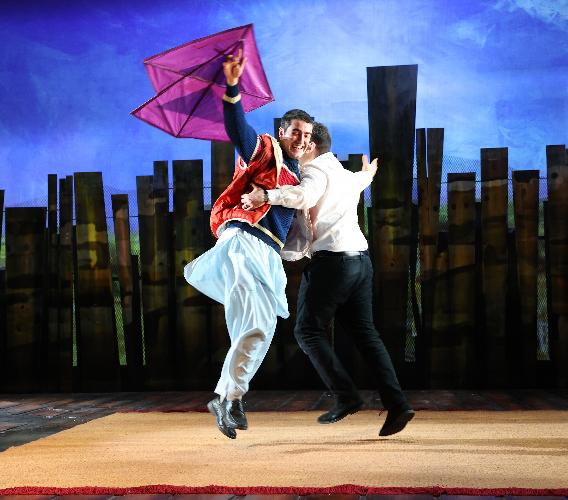The Kite Runner tells the story of Amir, a young boy growing up in Kabul, and his friend (and father's servant's son) Hassan. After a devastating incident (please see content warnings for this play) where Hassan's loyalty to Amir is taken to the greatest of limits, Amir's guilt leads him to make more decisions to Hassan's detriment, and we follow Amir's adult life as he has to face his own demons, learn to forgive himself, and put right his wrongs. It is an incredibly nuanced and complex story of class, race, history, faith, and forgiveness, exploring challenges and opportunities of the human experience.
The trouble with this adaptation is that it really does very little to adapt. The script itself is generally lovely, if a little lacking in bite; but the greatest criticism here is that the pages of the original text are brought to life without achieving anything new, different, or more impactful than its source material. Indeed, committing the cardinal play text sin of telling without showing, we are spoken at by Amir for most of this production. It certainly retains the spirit of the book itself, but mostly because there is very little innovation or understanding of the opportunities theatre presents; moreover, due to theatre's limitations, most of what it does feels like it would be more effective written down! Because of this, revelations that we could pick up from context and unspoken hints are constantly spoon-fed to the audience (with the exception of a returning villainous character that was done so well gasps filled the auditorium!) and thus their potency is muffled; moreover, other key themes of the story (such as Amir's guilt and shame and journey to forgiveness) are lost when they could be given centre-stage.
There are some stand-out theatrical moments which really are triumphant, namely the kite flying scenes and the harrowing depiction of Hassan's assault (though again we are given needless narration, undercutting the horror of what has just been presented to us) - though an ensemble of mixed talent, they work together beautifully and with high energy, producing a few outstanding takeaways. Other than a general inability to portray children as anything other than cartoonish, the main thing lacking from performances is the deep emotional intensity and sincerity necessary for telling such a complex and dark story. Stuart Vincent is certainly a gifted comedian (evident not only in his exquisite comic timing throughout, but a speech given as himself post-curtain call) and has a delightfully warm presence on stage, but Amir's emotional journey is not an easy one to pull off effectively, not least when most of that is coming from audience-facing narration in the first place! Interestingly, Yazdan Qafouri leans into emotional vulnerability beautifully as Sohrab, but his Hassan doesn't feel genuine. Perhaps this is in part due to the relationships that are so integral to this story never feeling honest, with the exception of Amir and Baba (Dean Rehman). Bhavin Bhatt is exquisitely evil as Assef, expertly toeing the line of childish bully and horrifying psychopath, though it would be worth considering more than simply a gravelly voice to emphasise the sinister villain he becomes later in life.
This production is visually and technically stunning. Barney George's set is simple but supremely effective, highlighting the threads that remain across cultures while keeping the image of a kite central to the story; Charles Balfour's lighting is subtle but expertly used to create moments of aesthetic perfection on stage (barring some distracting and confusing shadows); and, if a little on the nose, the live ambient music and drums underpinning significant points in the story is very affecting (though perhaps we could lose the unrealistic and ultimately unnecessary gun-shots throughout the production).
A beautiful story, possibly better kept in its book, The Kite Runner plays at Richmond Theatre until 16th March before continuing its tour.
Review: Penny Lane Photo: Barry Rivett for Hotshot Photography

